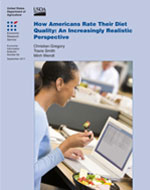How Americans Rate Their Diet Quality: An Increasingly Realistic Perspective
- by Christian A. Gregory, Travis A. Smith and Minh Wendt
- 9/23/2011
Overview
Over the last 20 years, awareness of diet-related health concerns has become widespread in the United States as obesity, along with its associated human and financial costs, has increased. To estimate how this awareness affects Americans' perceptions of their own diet quality over this period and the factors associated with self-assessed diet health, we examine data from both the 1989-91 Continuing Survey of Food Intakes of Individuals and the 2005-08 Flexible Consumer Behavior Survey module of the National Health and Nutrition Examination Survey. We find, first, that Americans have become much less likely to rate their diets as "Excellent" or "Very Good" in terms of healthfulness, even though the healthfulness of the American diet has undergone little change over this period. Second, current self-ratings of diet are inversely related to the frequency of fast food and food-away-from-home consumption and positively related to the frequency of sharing meals with family. In addition, self-ratings of diet are positively associated with household availability of dark green vegetables and low-fat milk and negatively associated with availability of sweetened soft drinks.
Download
-
Entire report
Download PDF -
Report summary
Download PDF -
Download EIB83.zip
Download ZIP

